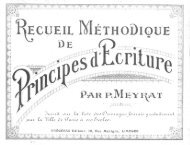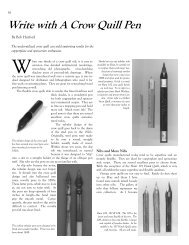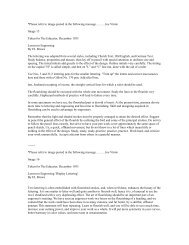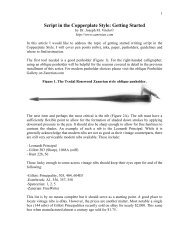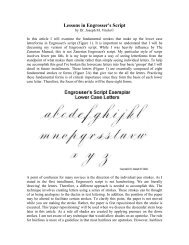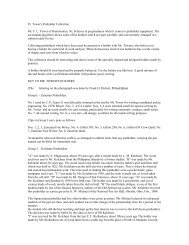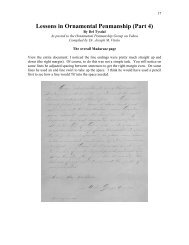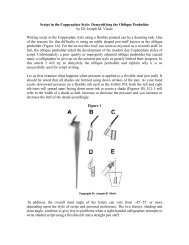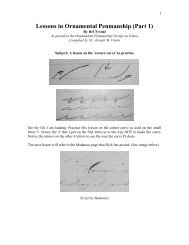The Educator (Volume 45) - IAMPETH
The Educator (Volume 45) - IAMPETH
The Educator (Volume 45) - IAMPETH
Create successful ePaper yourself
Turn your PDF publications into a flip-book with our unique Google optimized e-Paper software.
12<br />
"Handwriting--Its Relation to Physical<br />
and Mental Health''<br />
From the days of oui- early fathers<br />
down to the present time education<br />
has been acknowledged as necessary<br />
for the preservation of our democracy.<br />
<strong>The</strong> three R's—Reading, Writing<br />
and Arithmetic — are the fundamentals<br />
of education and without<br />
these a child can make no progress<br />
in school or in community life.<br />
Professor Robert Woellner, head of<br />
vocational guidance at Chicago University<br />
says: "<strong>The</strong> primary purpose<br />
of the schools still is and always<br />
should remain to teach the three<br />
R's. What is left over in funds and<br />
energy may be used for character<br />
building." We would add to this citizenship<br />
and competence.<br />
We've expanded the early three<br />
R's and enlarged the activities to enrich<br />
the child's opportunity.<br />
Handwriting has a very important<br />
relation to physical and mental<br />
health.<br />
Good physical health is of utmost<br />
importance and we must make every<br />
effort to keep it and protect it. School<br />
superintendents and school boards<br />
are building finer and better equipped<br />
buildings as time moves on.<br />
Heating, ventilating, and lighting are<br />
of the best type. Even in the older<br />
buildings new heating, ventilating<br />
and lighting systems are installed.<br />
<strong>The</strong> thermostats keep the room at<br />
even temperafures. Ventilation of<br />
school rooms is a problem. In our<br />
new buildings we have air circulating<br />
units installed and there is a constant<br />
flow of fresh air. School<br />
rooms are equipped with indirect<br />
lighting- systems and we have no<br />
shadows to guard against. We must<br />
have good heating, ventilation, and<br />
lighting to have a successful handwriting<br />
lesson. Good light relieves<br />
eyestrain; on dark days teachers<br />
write larger on the board and often<br />
use light yellow chalk which protects<br />
the eyesight and lessens eye fatigue.<br />
In a new school in Marion County,<br />
Indiana, they have "white blackboards".<br />
In place of the black slate<br />
or black composition board there are<br />
sections of plate glass ground to present<br />
a proper surface. Writing is<br />
best done with charcoal. When using<br />
white chalk on blackboards there is<br />
often a glare and blurring of material<br />
placed upon the board. By<br />
using the "white blackboards" perfect<br />
visibility may be had from all<br />
parts of the room. Colored crayon<br />
may be used to good advantage, too.<br />
IDA S. KOONS<br />
Handwriting Supervisor, Fort Wayne, Indiana<br />
<strong>The</strong> desks must be adjusted to fit<br />
the child so that an easy healthful<br />
position of the body may be had.<br />
Good posture is necessary to good<br />
health for it aids respiration, circulation,<br />
digestion, and glands of internal<br />
secretion. It also relieves<br />
muscular and nervous strain. One of<br />
the fundamental principles of handwriting<br />
is good posture and good<br />
position.<br />
Good mental health may depend on<br />
good physical health. Dr. Laurance<br />
Shaffer of Carnegie Institute of<br />
Technology in "<strong>The</strong> Psychology of<br />
Adjustment" gives the following:<br />
"<strong>The</strong> aims of education and mental<br />
hygiene should be the same, namely<br />
the development and training of the<br />
individual for effective living in his<br />
social environment. Popular opinion<br />
and the judgments of educational<br />
philosophers unite in recognizing that<br />
the most important outcomes of education<br />
are the general habits and attitudes<br />
that make the individual better<br />
able to attack his life problems<br />
rather than the specific skills and bits<br />
of information that he acquires."<br />
Dr. Henry Link, internationally<br />
known psychologist, in his book "<strong>The</strong><br />
Rediscovery of Man" demonstrates<br />
that by right habits and attitudes<br />
inspired by right standards and<br />
training the individual will grow into<br />
strength. He says "Personality is<br />
the extent to which the individual<br />
has learned to convert his energies<br />
into habits or activities which successfully<br />
influence other people." In<br />
a recent address in our city he<br />
pointed out the universal habits of<br />
thinking which are recommended for<br />
all children and which he called "sea<br />
level habits" of thinking — reading,<br />
writing, and arithmetic.<br />
<strong>The</strong> purpose of handwriting is to<br />
develop the skill of each child to such<br />
an extent that it is a convenient tool<br />
of expression for use in everyday<br />
life. If writing is to be taught as a<br />
usable tool the child must feel a real<br />
Bv Parker Zaner Bloser<br />
need for it and then must have sufficient<br />
practice to gain satisfaction<br />
from his effort. It is only by patient<br />
and attentive repetition that correct<br />
writing habits are established and<br />
skill acquired. Professor William<br />
James says that without the faculty<br />
of forming habits we simply could<br />
not live.<br />
Most strong habits are acquired as<br />
a result of strong motives, two of<br />
which are the mastei-y motive and the<br />
social approval motive. In the mastery<br />
motive there is the urge to excel<br />
and in the social approval motive<br />
there is the urge to seek approval<br />
of other people.<br />
Handvirriting lends itself here for<br />
it is a tool of expression. Repeated<br />
failure in school subjects blocks or<br />
thwarts the pupil's strong motives<br />
for mastery and approval. Denied<br />
satisfaction in achievement the pupil<br />
may become a behavior problem.<br />
<strong>The</strong> work of the teacher is to provide<br />
opportunity for a suitable task<br />
and the conditions which make success<br />
for the individual possible.<br />
Praise and encouragement should replace<br />
destructive criticism and failure.<br />
This creates a desire for the<br />
pupil to do better work. In the event<br />
the child has ability he will attempt<br />
to live up to it. In handwi-iting a<br />
child competes with his own past<br />
record and strives to improve, therefoi'e<br />
we feel in giving awards for<br />
good work one does no mental harm<br />
to any pupil in the class. If each<br />
child can be made to feel some measure<br />
of success he will have a better<br />
attitude toward the subject and<br />
school.<br />
Just so was education formerly<br />
considered— a pouring in process and<br />
what was the result ?<br />
May it not be better for us and the<br />
children in working with the tools of<br />
writing and the language arts that<br />
we "study to show ourselves approved—workmen<br />
that needeth not<br />
to be ashamed."



